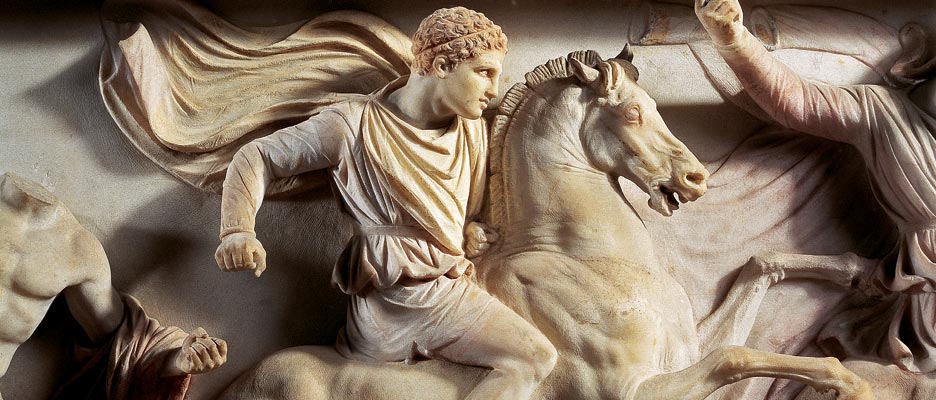Alexander the Great, one of the most successful and inspirational leaders in history, ruled the Empire of Macedon. His empire stretched from Europe to India and created a legacy that many looked to emulate and, more importantly, attempted to claim.
Today, Macedonia’s geography is disputed and, much like the Balkan’s, its location depends on whom you ask.
Two regions identify as “Macedonia” – one is a province in northern Greece and the other is an actual country, with its official name being the Republic of Macedonia. When Yugoslavia split and each region became its own separate state – the Republic of Macedonia being one of them – Greece did not recognize the newly formed state by its constitutional name. Instead, they use the term FYROM, short for Former Yugoslav Republic of Macedonia, as they want to clearly distinguish between the two.
People who identify as Macedonian in both regions share a language, culture, and unique traditions that set them apart from neighbouring nations. Many view the border between Greece and the Republic of Macedonia as an unnatural partition between the Macedonian people. The border that is separating a group of people that long to hold onto their traditions has created a name dispute that acts as a political lock on Greek and Macedonian advancement.
Greece views the term “Macedonians” as all Greek citizens living in the province of Macedonia, while seeing their northern neighbour’s name as a threat to Greek territory, history, and culture. It views citizens of the Republic of Macedonia as Slavs instead of sharing a bloodline with Macedonians, and feel that as long as the nation uses the name Macedonia and celebrates Macedonian history, it is stealing a part of Greek culture.
Naturally, Macedonians perceive their identity as being restricted and pushed aside. They interpret that their history of thousands of years is restricted to the 40-plus years as a member of Yugoslavia. Ongoing disputes have politically handicapped Macedonia, as Greece boycotted the Republic of Macedonia’s entrance into the EU and NATO. Greece also made the United Nations recognize its northern neighbours as FYROM, much to the dismay of the Republic of Macedonia.
COMMUNICATING WITH THE WEST
Due to the importance of the region in terms of incoming refugees, Greece and Macedonia have had to work together more than ever. To support their story during a sensitive period, the Greek Ministry of Foreign Affairs recently published a report on the issue here. However, Greek ministers have succumbed to Freudian slips and even referred to FYROM as the Republic of Macedonia, causing public outrage in Greece.
Naturally, the West sees something inherently fascinating about a nation holding back the development of another over a name dispute. But because Greece is a part of the Western world, it does not allow Macedonia to enter into important Western institutions. Both are now brothers in crime, perpetually in a lose-lose situation that has the world asking, “What’s in a name?”
For Macedonia to ever develop and become something respected by the Western world, it needs to adhere to guidelines and policies influenced by its Greek neighbours. Since Macedonia is not permitted to enter NATO or the EU, even though its population overwhelmingly supports accession, the political consciousness of that state is interpreted as being trivial compared to Western nations. To ever make gradual steps toward globalization, Macedonia is required to do the unthinkable: effectively reconfigure its identity and revise what makes it uniquely Macedonian.
When the hurdles are insuperable and come far too early, it ruins political innovation. The West must not think of Macedonia as a nation too stubborn to change its name even though it holds back development. Rather, they must ask: what motivation do Macedonian politicians have for making improvements if you consistently ask them to lose their identity?
IDENTITY FORMATION
The identity of the Balkans remains confused and at times inconsistent. On one hand, all the nations share similar cultural aspects, and yet Serbo-Croatian, Albanian, Greek and Romanian are all completely unrelated languages. They all share a common history of war and occupation with varying degrees of successful empire-building, and yet they share different religions, different allies, different objectives, and consistently shifting borders.
How do Balkan nations find a new identity that allows them to communicate and connect with Western Europe? When the world thinks of anything east of Germany, they imagine the remnants of the USSR. In reality, seven nations in the Balkans thought to have been under the Soviet regime never were, and they would prefer to be likened to Greece – a nation in the Balkans known to never be under the USSR. In this sense, the general identity that they share is viewed incorrectly.
Some Balkan nations are hesitant to acknowledge that Western civilization has made drastic improvements to their way of life for fear of losing their own culture. In the Balkans, there is difficulty distinguishing between globalization and Westernization, and this precisely makes it difficult to form a much-needed new identity. Outside the Balkans, there is a distinct separation of ability between the West discovering problems in the region and the West solving problems in the region.
In this case, the West is right to condemn ethnic nationalism considering that it delays Balkan progression. However, nationalism has created an illusion about Balkan citizens and led to the West asserting to changing the Balkans according to an external vision rather than build a system based on existing identity structures. On moral grounds, ethnic nationalism should be condemned, but it is important to understand the dynamics of Macedonian identity are so complex that ethnicity either affirms or denies social rights, depending arbitrarily on the circumstances of location.
If the West doesn’t understand the citizens in Greece and Macedonia, as most claim it does not, then an ethical question needs to be raised regarding any EU and NATO requirements imposed on the Republic of Macedonia that are influenced by Greece. In this atmosphere, the current verbal civil war will continue with newly cemented nationalistic markers on both sides; statues, monuments and museums will continue to be built for future Greek and Macedonian citizens perpetuating its stories.
Macedonia, in democratic fashion, has asked for inclusion into the new world and is ready to develop through a fair checklist of responsibilities. Forming a new identity while curbing nationalism is important for the Balkans, but there is no way for the EU to morally contain one nationality, Macedonian, for preference of the other, Greek. For the West to allow Greece to restrict Macedonia’s development is contradictory to the values they represent; this is what Macedonians are waiting for the West to realize.




